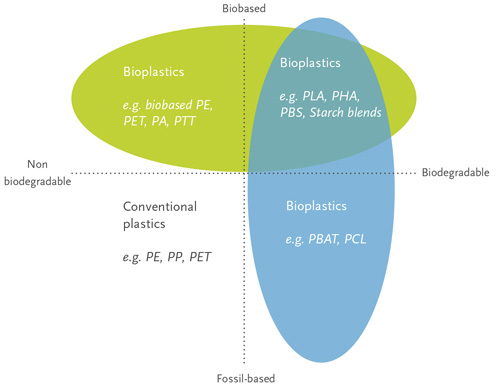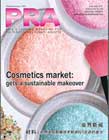PRA Chinese
Rubber Journal Asia Injection Moulding Asia Energy, Oil & Gas Asia
VISIT OUR OTHER SITES:
PRA Chinese
Rubber Journal Asia
Injection Moulding Asia
Energy, Oil & Gas Asia
New plastic waste strategy in Europe misses out benefits of biobased/biodegradable plastics
The European Strategy for Plastics, published recently by the European Commission, sets clear goals to curb plastic waste, increase resource efficiency, and to create value and job growth in Europe, but it falls short on presenting a comprehensive approach by limiting the focus of the strategy on mechanical recycling, says the European Bioplastics (EUBP). Concrete steps towards reducing the dependency on fossil feedstock by linking the circular economy with the bioeconomy and supporting innovative bio-based plastics solutions have been further postponed. Moreover, the contributions of biodegradable plastics to a circular economy are recognised but concrete measures are still missing, says EUBP.
“Plastics made from renewable raw materials are a sustainable alternative for many plastic products,” says François de Bie, Chairman of EUBP, the association of the bioplastics industry in Europe, and adds: “For some applications, recycled plastics are not always suitable due to lower quality or for safety reasons. While the increase of recycled content in plastics is important to reduce virgin fossil feedstock, alternative sustainable feedstocks such as bio-based feedstocks need to be encouraged as well in order to defossilise the plastics economy.”

Replacing a significant proportion of the conventional fossil feedstock by plant-based alternatives would reduce greenhouse emissions and help to reach the UN Sustainable Development Goals and the Paris Agreement. At the same time, the mobilisation of EU-grown biomass for the production of bio-based plastics would provide impulses for jobs and growth in the bioeconomy sector and the opportunity to EU farmers to valorise side streams and by-products and to tap additional revenue streams.
EUBP welcomes the importance the Commission has given to biodegradable and compostable plastics and their role in separate collection systems for organic waste in order to improve clean waste streams and recycling quality. The benefits and circular use of biodegradable plastics have to be foremost considered in this context of organic recycling. EUBP looks forward to collaborating with the Commission on identifying applications and measures to stimulate innovation and drive market development in this field.
“In addition to organic recycling, biodegradable plastics have the potential to offer benefits with respect to reducing the impact of some applications on the marine environment. In a next step, appropriate materials, applications, standards, and environmental claims and communication have to be specified together with the Commission and other relevant stakeholders in upcoming initiatives as outlined in the strategy”, says de Bie.
“We also appreciate the commitment of the Commission to make a clear distinction between biodegradable plastics and so-called ‘oxo-degradable’ plastics that falsely claim to biodegrade. We therefore strongly welcome the decision of the Commission to restrict the use of oxo-plastics in the EU”, says de Bie. “In this context, we will also work with the Commission on clearer and unambiguous communication and environmental claims and to increase efforts for better consumer information on the correct disposal of the different types of bioplastics.”
EUBP is looking forward to closely working together with the EU institutions and all relevant stakeholders in the upcoming discussions following the EU Plastics Strategy in order to ensure that the initial acknowledgements of alternative bio-based feedstocks and of biodegradable plastics will be further developed throughout the actions outline in the annex of the strategy.
(PRA)Copyright (c) 2017 www.plasticsandrubberasia.com. All rights reserved.
























































